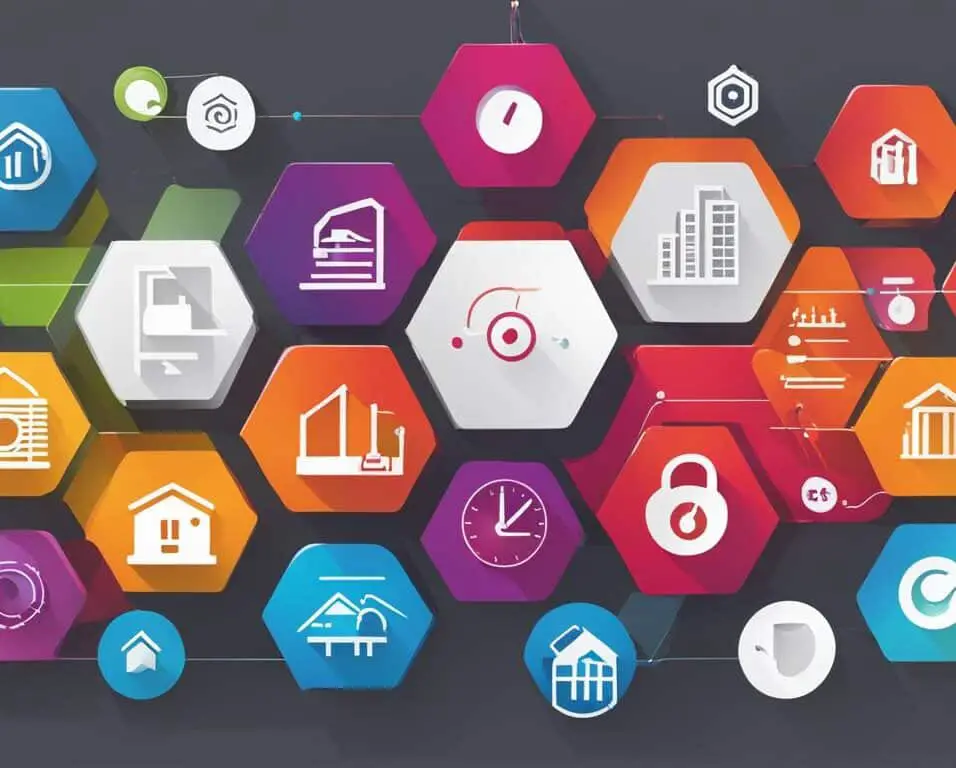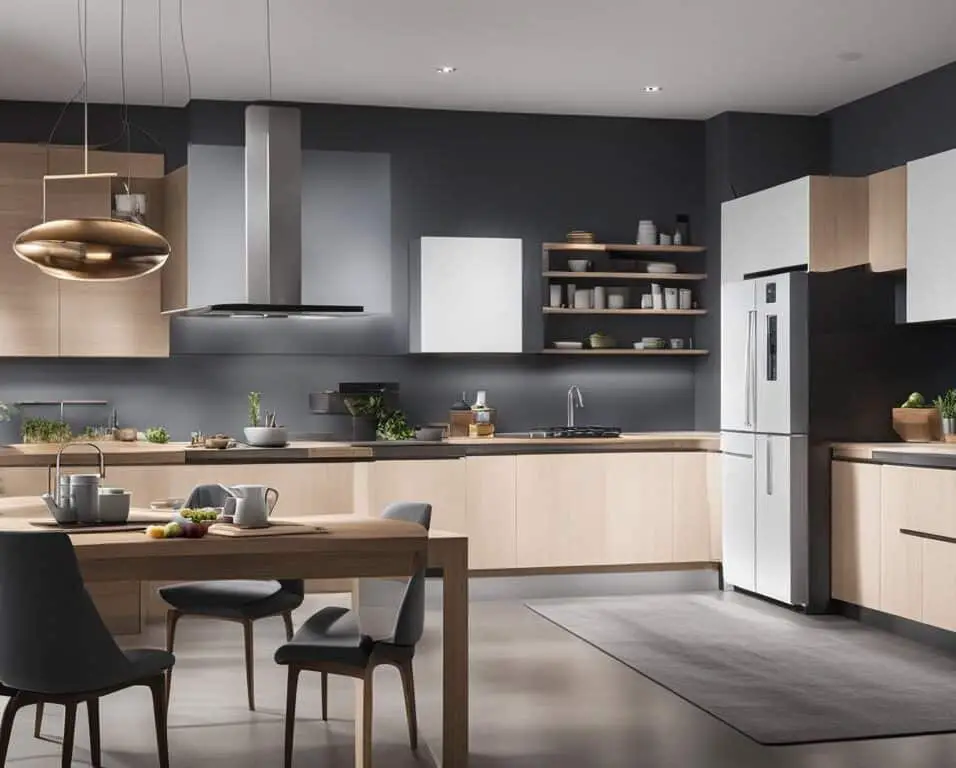IoT Devices: Revolutionizing Home Management
Welcome to the era of smart homes, where IoT devices are revolutionizing the way we manage our living spaces. From controlling appliances with a touch of a button to enhancing our security systems, integrating IoT devices into our homes has opened up a world of efficient smart home solutions.
IoT, or the Internet of Things, refers to the network of interconnected devices and sensors that make up a smart home ecosystem. These devices are designed to enhance comfort, security, energy efficiency, and convenience, creating a seamless and interconnected living experience.
Imagine being able to automate routine tasks or remotely manage your home’s systems, all from the palm of your hand. With IoT devices, you have the power to control your lights, thermostat, appliances, and more, effortlessly.
Key Takeaways:
- Smart homes are equipped with IoT devices that enhance comfort, security, energy efficiency, and convenience.
- Key applications of IoT in smart homes include home automation, security, energy efficiency, entertainment, health and well-being, home maintenance, home appliances, and voice assistants.
- Integrating IoT in smart homes offers benefits such as convenience, enhanced security, energy efficiency, personalization, safety, and accessibility.
- Challenges in adopting IoT in smart homes include data security, interoperability, reliability, cost, and workforce training.
- The future of IoT in smart homes includes trends like artificial intelligence, enhanced security, interconnectivity, sustainability, and integration with smart cities.
Key Applications of IoT in Smart Homes
The integration of IoT devices in smart homes offers a wide range of applications that enhance convenience, security, energy efficiency, and entertainment. Let’s explore the key applications of IoT in smart homes:
1. Home Automation
IoT enables home automation by allowing homeowners to control various devices remotely or on a schedule. Lights, thermostats, and appliances can be automated, providing convenience and energy savings.
2. Security and Surveillance
Smart homes equipped with IoT devices like smart doorbells, cameras, motion sensors, and smart locks enhance security and surveillance. Real-time monitoring and instant alerts provide peace of mind and proactively deter potential threats.
3. Energy Efficiency
IoT devices contribute to energy-efficient smart homes. Smart thermostats, lighting systems, and appliances can be programmed to operate efficiently, reducing energy consumption and saving homeowners money.
4. Entertainment
IoT enables integrated control of entertainment systems in smart homes. Smart TVs, streaming devices, and audio systems can be interconnected and controlled through a centralized hub, enhancing the overall entertainment experience.
5. Health and Well-being
IoT devices play a significant role in improving health and well-being in smart homes. Remote health monitoring devices and medication reminders empower patients and the elderly to manage their health effectively.
6. Home Maintenance
IoT sensors in smart homes monitor the condition of various systems, such as HVAC and plumbing, and send homeowners alerts when maintenance is required. This proactive approach to home maintenance helps prevent costly repairs.
7. Home Appliances
IoT-enabled home appliances revolutionize the way homeowners interact with their devices. These devices can communicate with homeowners, providing notifications, usage information, and even automatically ordering replacement parts.
8. Voice Assistants
Voice assistants like Amazon Echo and Google Home enhance the interactive experience of smart homes. These devices control various IoT devices, answer queries, and provide seamless integration with other applications.
By leveraging these applications, IoT transforms traditional homes into smart, connected spaces that adapt to the needs and preferences of homeowners.
Benefits of IoT in Smart Homes
| Benefit | Description |
|---|---|
| Convenience | Enables remote control and automation of tasks |
| Enhanced Security | Real-time monitoring, alerts, and smart security systems |
| Energy Efficiency | Optimizes device operation and reduces energy consumption |
| Personalization | Adapts to individual preferences and needs |
| Safety | Features like smart locks and security cameras |
| Accessibility | Improves living conditions for individuals with disabilities |
Benefits of IoT in Smart Homes
The integration of IoT in smart homes provides a myriad of benefits that enhance our daily lives and transform the way we interact with our living spaces. These benefits include:
Convenience
With IoT devices, controlling and managing your smart home becomes effortless. Through remote control capabilities, you can easily operate devices and automate routines, allowing you to conveniently adjust lighting, temperature, and other settings from anywhere in your home or even when you’re away.
Enhanced Security
IoT-enabled security systems provide real-time monitoring and alerts, boosting the safety of your home and loved ones. With smart cameras, doorbells, motion sensors, and locks, you can keep a watchful eye on your property and receive instant notifications in case of any suspicious activity.
Energy Efficiency
IoT devices contribute to energy conservation by optimizing the operation of devices and reducing overall consumption. Smart thermostats automatically adjust temperature settings based on occupancy and preferences, while smart lighting systems intelligently control lights to save energy while maintaining comfort.
Personalization
IoT devices learn from your behaviors and preferences, allowing them to adapt and personalize your smart home experience. Whether it’s adjusting temperature settings, recommending preferred lighting scenes, or providing customized entertainment options, smart homes can cater to your individual needs and preferences.
Safety
Smart home features such as smart locks, security cameras, and smoke detectors significantly enhance home safety. You can remotely monitor and control access to your home, receive alerts in case of security breaches, and ensure that your loved ones and belongings are protected.
Accessibility
For individuals with disabilities, smart homes powered by IoT technology offer newfound accessibility and independence. With voice control and automation, tasks that were once challenging can now be easily accomplished, improving the overall quality of life and fostering inclusivity.
Experience the countless benefits of IoT in your smart home and enjoy the convenience, enhanced security, energy efficiency, personalization, safety, and accessibility it brings.

Challenges and Considerations
While IoT in smart homes brings numerous benefits, it also presents some challenges and considerations that need to be addressed. These include:
- Data Security and Privacy: Protecting personal information is crucial in IoT-enabled homes. Robust security measures must be in place to safeguard data from cyber threats and ensure privacy.
- Interoperability: Ensuring seamless data exchange and integration among different IoT devices and systems is essential for a unified and interconnected smart home experience.
- Reliability: Homeowners rely on the proper functioning of IoT devices. Ensuring the reliability of these devices is crucial to maintain trust and confidence in the technology.
- Cost of Implementation: The initial cost of implementing IoT in smart homes can sometimes be a barrier for homeowners. Consideration of the return on investment and long-term financial implications is necessary.
- Workforce Training: Successful adoption of IoT technology often requires proper training for homeowners and other household members to understand and utilize the features and benefits effectively.
Data Security and Privacy
Protecting personal information is paramount in smart homes where numerous IoT devices collect and transmit data. It is essential to implement robust security measures to prevent unauthorized access and ensure privacy. Encryption, strong authentication protocols, and regular software updates can help mitigate the risks.
Interoperability
Interoperability refers to the ability of different IoT devices and systems to exchange data seamlessly and work together to deliver a comprehensive smart home experience. Achieving interoperability requires industry standards, protocols, and frameworks to be followed by manufacturers and developers. This ensures that IoT devices from different brands can communicate and integrate efficiently, enhancing convenience and functionality.
Reliability
Homeowners rely on the proper functioning of IoT devices for various tasks and functions. Device reliability is crucial to maintain the trust of homeowners and prevent disruptions to their daily routines. Manufacturers must prioritize quality control, rigorous testing, and ongoing support to ensure that IoT devices perform reliably and consistently.
Cost of Implementation
The cost of implementing IoT in smart homes can vary depending on the scale and complexity of the system. Homeowners need to consider not only the upfront costs of purchasing devices but also the potential long-term savings and benefits. Conducting a cost-benefit analysis can help homeowners make informed decisions and assess the overall value of integrating IoT into their homes.
Workforce Training
The successful adoption of IoT technology requires proper training for homeowners and other household members. Understanding how to use and control IoT devices, as well as troubleshooting common issues, is essential for maximizing the benefits of a smart home. Training programs and resources should be provided to ensure that users feel confident and empowered to leverage the capabilities of IoT devices.
| Challenges | Solutions |
|---|---|
| Data Security and Privacy | Implement robust security measures such as encryption, authentication protocols, and regular software updates. |
| Interoperability | Follow industry standards, protocols, and frameworks to ensure seamless data exchange and integration among different IoT devices. |
| Reliability | Prioritize quality control, rigorous testing, and ongoing support to ensure the reliability and consistency of IoT devices. |
| Cost of Implementation | Conduct a cost-benefit analysis to assess the overall value and long-term savings of integrating IoT into smart homes. |
| Workforce Training | Provide training programs and resources to empower homeowners and household members to effectively use and control IoT devices. |
Addressing these challenges and considerations will contribute to the successful integration of IoT technology in smart homes, unlocking the full potential of convenience, security, and energy efficiency that IoT devices offer.
The Future of IoT in Smart Homes
As technology continues to advance, the future of IoT in smart homes holds a world of possibilities. With the integration of artificial intelligence (AI), IoT devices will become more intelligent, adaptive, and efficient in automating daily tasks. AI algorithms will enable smart homes to learn user preferences and patterns, leading to personalized and seamless experiences.
One significant area of development in the future of IoT is enhanced security. Machine learning and AI-powered security systems will play a pivotal role in detecting and responding to threats in real-time. These intelligent systems will employ advanced analytics to identify anomalies and protect the privacy and safety of smart home occupants.
Interconnectivity will also be a key focus in the future of IoT in smart homes. IoT devices from various manufacturers and ecosystems will become more compatible, allowing for seamless integration and ease of use. This interconnectivity will enable a more unified and streamlined experience for homeowners, eliminating the need for multiple apps and interfaces.
Sustainability will be a major driver in the future of IoT. With a growing emphasis on environmental consciousness, IoT devices will be designed to minimize resource consumption and waste. Energy-efficient smart home solutions will contribute to reduced carbon footprints and more sustainable living.
Moreover, the future of smart homes extends beyond individual residences. Integration with smart cities will become more prevalent, creating a holistic and interconnected urban ecosystem. Smart homes will interact with larger city infrastructures, optimizing energy usage, transportation, waste management, and public services. This integration will lead to more sustainable and efficient urban living, benefiting both individuals and communities.

Benefits of the Future IoT in Smart Homes:
- Intelligent and adaptive automation
- Enhanced security systems powered by AI
- Seamless interconnectivity among devices
- Sustainability through energy-efficient solutions
- Integration with smart city initiatives
In conclusion, the future of IoT in smart homes holds tremendous potential for transforming our living spaces. With advancements in AI, enhanced security, interconnectivity, sustainability, and integration with smart cities, smart homes will continue to redefine the way we live, bringing convenience, efficiency, and a more connected world into our everyday lives.
Conclusion
The integration of IoT devices has revolutionized home management, bringing smart home automation to the forefront. Smart homes equipped with IoT technology offer unparalleled convenience, security, energy efficiency, and personalization. Despite challenges in data security, interoperability, reliability, cost, and training, the future of IoT in smart homes holds tremendous promise.
As technology continues to evolve, smart homes will evolve with it, becoming more responsive, efficient, and aligned with the individual needs and preferences of homeowners. The convenience of remotely controlling various IoT devices, from lights to appliances, and even security systems, provides homeowners with a new level of control and ease of use.
In addition to convenience, the integration of IoT devices also enhances the security of smart homes, with real-time monitoring, alerts, and smart security systems ensuring the safety of occupants. Energy efficiency is another key benefit, as IoT-enabled devices can be programmed to operate at optimal settings, reducing energy consumption and reducing utility costs.
The future of IoT in smart homes holds even greater potential, with advancements in artificial intelligence, enhanced security systems, interconnectivity, sustainability, and integration with smart cities. As homes become increasingly interconnected and IoT systems continue to advance, the possibilities are endless. Embracing IoT technology in smart homes not only improves quality of life but also transforms the way we interact with our living spaces, ushering in a new era of connected living.
FAQ
What are IoT devices?
IoT devices are physical objects embedded with sensors, software, and connectivity capabilities that enable them to collect and exchange data over the internet. In the context of smart homes, IoT devices are used to enhance comfort, security, energy efficiency, and convenience.
How are IoT devices integrated into smart homes?
IoT devices are integrated into smart homes through a network of interconnected devices and systems. These devices communicate with each other and with centralized control systems, allowing users to remotely control and automate various aspects of their homes.
What are the key applications of IoT in smart homes?
The key applications of IoT in smart homes include home automation, security and surveillance, energy efficiency, entertainment, health and well-being, home maintenance, home appliances, and voice assistants.
What are the benefits of integrating IoT in smart homes?
The benefits of integrating IoT in smart homes include convenience, enhanced security, energy efficiency, personalization, safety, and accessibility.
What are the challenges and considerations of using IoT in smart homes?
The challenges and considerations of using IoT in smart homes include data security and privacy, interoperability, reliability, cost of implementation, and workforce training.
What is the future of IoT in smart homes?
The future of IoT in smart homes includes trends like artificial intelligence (AI), enhanced security, interconnectivity, sustainability, and integration with smart cities.
Source Links
- https://medium.com/@equitysoft/revolutionizing-home-living-with-iot-based-smart-home-automation-1cfa651825ff
- https://www.linkedin.com/pulse/how-internet-things-revolutionizing-smart-homes-exploring
- https://iotbusinessnews.com/2023/11/10/89810-the-smart-home-revolution-how-iot-is-transforming-modern-living/








